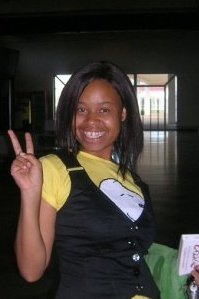Get active Zimbabwe!
Tuesday, April 20th, 2010 by Bev ClarkLast week I had the privilege to witness WOZA trying to hand over a petition to the management of the Zimbabwe Electricity Supply Authority (ZESA) at their headquarters at Megawatt House on Samora Machel Avenue in Harare.
I say privilege because there are very few organisations, activists and members of the public in Zimbabwe who are brave enough to put themselves on the street and demand a better Zimbabwe, be that in the delivery of justice or basic services.
The gathering of WOZA men and women was peaceful, good humoured and vibrant. The crowd that came around to witness the proceedings all agreed that Zimbabweans are reeling under the utility charges and poor service that they are receiving. As one of our bloggers, Dydimus Zengenene, rightly points out this week, ZESA’s charges might be in line with regional tariffs but our salaries are woefully inadequate to cope with the demands being placed on us.
In the meantime the chefs of Zimbabwe, ranging from Mugabe, to the ZESA hierarchy itself, to the champions of the indigenisation bill, are all pretty comfortable in their plush homes lit by generators.
The leadership of WOZA were arrested and spent Independence weekend in jail. This is an OUTRAGE.
Zimbabwe must allow for peaceful protest – full stop.
You probably weren’t a part of the WOZA protest at ZESA last week but it’s pretty certain that you’re affected by poor service and high electricity charges.
So, here’s something you Can do . . .
Action: Email the ZESA public relations department and tell them that:
a) ZESA management must lobby for the immediate release of the WOZA leadership
b) ZESA management must meet with WOZA to listen to, and discuss the issues being raised by Zimbabweans
c) ZESA management should issue an apology to WOZA for not welcoming them and hearing their concerns
Email: pr@zesa.co.zw



 If you have spent any amount of time in Harare, you’ll know of a popular spot called Mai Faffy’s. Located in the heart of Avondale – at one of the city’s busiest shopping complexes – Mai Faffy’s serves some of the tastiest sadza and relish to be had in Harare.
If you have spent any amount of time in Harare, you’ll know of a popular spot called Mai Faffy’s. Located in the heart of Avondale – at one of the city’s busiest shopping complexes – Mai Faffy’s serves some of the tastiest sadza and relish to be had in Harare.





